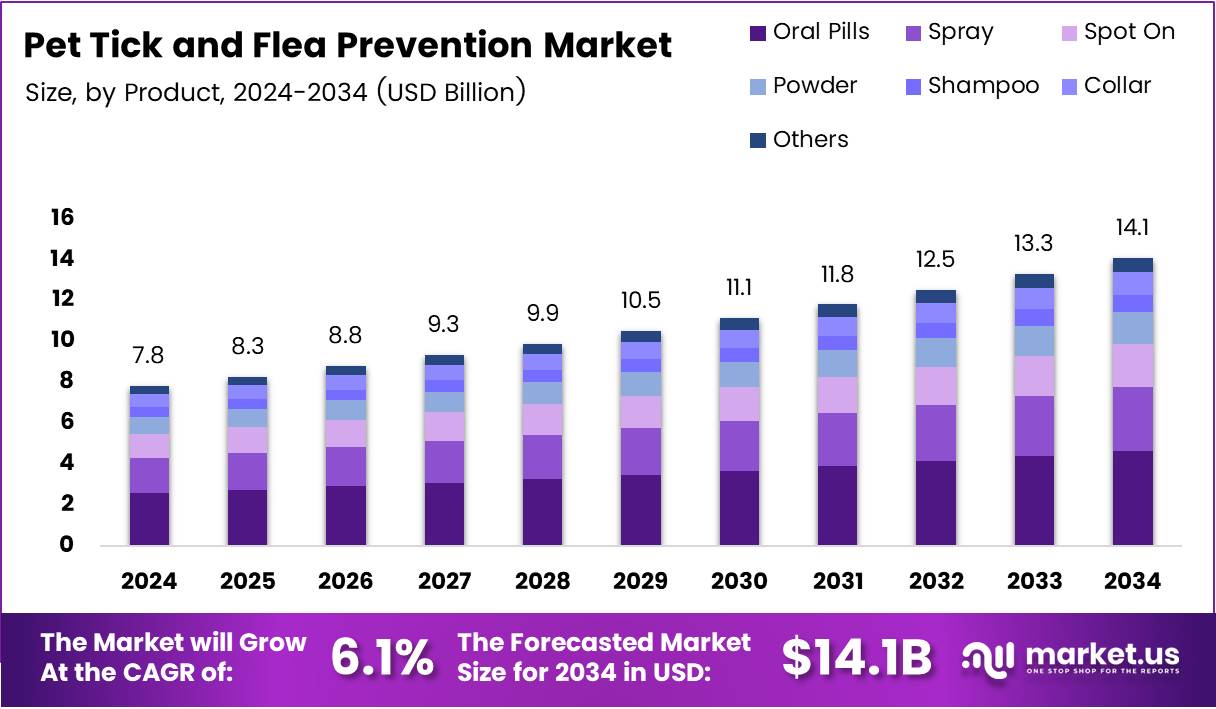Table of Contents
Introduction
The Global Pet Tick and Flea Prevention Market is experiencing steady expansion as pet owners increasingly prioritize preventive care. Valued at USD 7.8 Billion in 2024 and expected to reach USD 14.1 Billion by 2034, the market continues to evolve with a focus on safety, convenience, and long-lasting protection solutions. Rising awareness of parasite-borne diseases drives consistent interest in veterinary-approved treatments.
Additionally, evolving consumer preferences are influencing product development. Pet owners are now seeking prevention solutions that are easier to administer, offer extended relief, and align with natural and eco-friendly lifestyle trends. As manufacturers innovate oral, topical, and collar-based formulations with improved tolerability, the market is positioned for sustained growth across global regions.
Meanwhile, government initiatives promoting responsible pet ownership and expanding access to animal healthcare contribute to wider market adoption. The presence of strong animal health brands and increasing veterinary guidance reinforce market confidence, particularly in developed regions. As a result, the upcoming decade is set to witness a shift toward customized and long-duration protection products.

Key Takeaways
- The Global Pet Tick and Flea Prevention Market was valued at USD 7.8 Billion in 2024 and is projected to reach USD 14.1 Billion by 2034.
- The market is expected to grow at a CAGR of 6.1% during the forecast period 2025–2034.
- Oral Pills dominated the market by product type, capturing a 31.2% share in 2024 due to ease of administration and long-lasting effects.
- Dogs led the market by animal type with a 62.9% share, attributed to higher outdoor exposure and preventive care adoption.
- North America dominated the global market with a 45.9% share, valued at USD 3.5 Billion in 2024.
Market Segmentation Overview
Within the product type category, Oral Pills hold a dominant position due to their convenience and prolonged protection. They reduce the need for frequent dosing and are widely recommended by veterinarians. Spray and Spot-On treatments remain popular for fast relief and targeted application, while collars provide long-term, low-maintenance coverage for busy pet owners.
By animal type, Dogs represent the largest share of the market with a 62.9% contribution. Their higher exposure to outdoor environments increases the need for consistent tick and flea prevention. Cats hold a significant portion of the market as well, especially in urban households where indoor care and hypoallergenic formulations are in demand.
Drivers
Rising pet ownership worldwide is playing a key role in propelling market growth. As pet adoption rates increase, owners are more inclined to invest in preventive healthcare solutions that ensure their pets’ comfort and safety. Emotional bonding with pets encourages routine care and the purchase of premium flea and tick control products.
Awareness of parasite-caused diseases is also increasing, prompting a proactive approach to prevention. Flea allergies, Lyme disease, and tick-borne infections are compelling pet owners to choose regular treatments rather than emergency interventions. This shift strengthens long-term repeat purchasing behavior and supports product innovation.
Use Cases
Routine preventive care in households is one of the primary use cases. Pet owners apply spot-on solutions, oral pills, or collars to ensure continuous protection throughout the active flea and tick season. Ease of use and availability through online pharmacies enhance compliance and drive sustained demand.
Veterinary clinics use tick and flea prevention solutions as part of broader health wellness programs. Routine check-ups typically include discussions on preventive parasite control, increasing adoption of veterinarian-trusted brands. This professional endorsement boosts consumer confidence and ensures product consistency.
Major Challenges
Concerns regarding side effects related to chemical-based products create hesitation among pet owners. Skin reactions, digestive upset, and rare neurological symptoms can discourage product use and push consumers toward natural alternatives, which may offer varying levels of effectiveness.
Limited awareness in emerging and rural markets also restricts penetration. Many pet owners lack knowledge about preventive care or rely on reactive treatment, leading to inconsistent demand. This affects the overall adoption rate and slows growth in certain regions.
Business Opportunities
There is growing demand for natural, plant-based, and hypoallergenic formulations derived from botanical extracts. Brands that develop effective yet gentle solutions are well-positioned to capture new consumer segments seeking safe and eco-friendly alternatives.
Subscription-based e-commerce models create recurring revenue opportunities. Automated monthly or quarterly deliveries ensure continuous protection and improve user adherence, while building brand loyalty and long-term relationships with consumers.
Regional Analysis
North America leads the market with a 45.9% share, driven by high pet ownership rates and significant expenditure on veterinary care. The region benefits from strong product availability through both retail and digital platforms, along with an advanced veterinary advisory ecosystem that encourages preventive treatment adoption.
The Asia Pacific region is emerging as a high-growth market due to increasing pet adoption, rising income levels, and expanding urban veterinary services. Growing awareness about zoonotic diseases and improving access to professional pet healthcare are enabling faster market penetration.
Recent Developments
- Jul 2025: Fredun Pharmaceuticals acquired One Pet Stop, marking its strategic entry into the pet care wellness market.
- Mar 2025: PAI Partners announced acquisition plans for Nuzoa from Abac Capital to strengthen its presence in veterinary distribution across Europe.
- Jan 2024: Targeted PetCare, under Wind Point Partners, completed the acquisition of Pet Brands to expand its pet-treat portfolio.
Conclusion
The Global Pet Tick and Flea Prevention Market continues to expand steadily as pet owners prioritize preventive health management. Increasing awareness, accessibility, and ongoing innovation in oral, collar-based, and natural formulations are shaping future market dynamics. With strong adoption in developed regions and growing traction in emerging markets, the next decade presents clear opportunities for companies to enhance product safety, convenience, and long-term protection to meet evolving pet wellness expectations.
Discuss your needs with our analyst
Please share your requirements with more details so our analyst can check if they can solve your problem(s)



